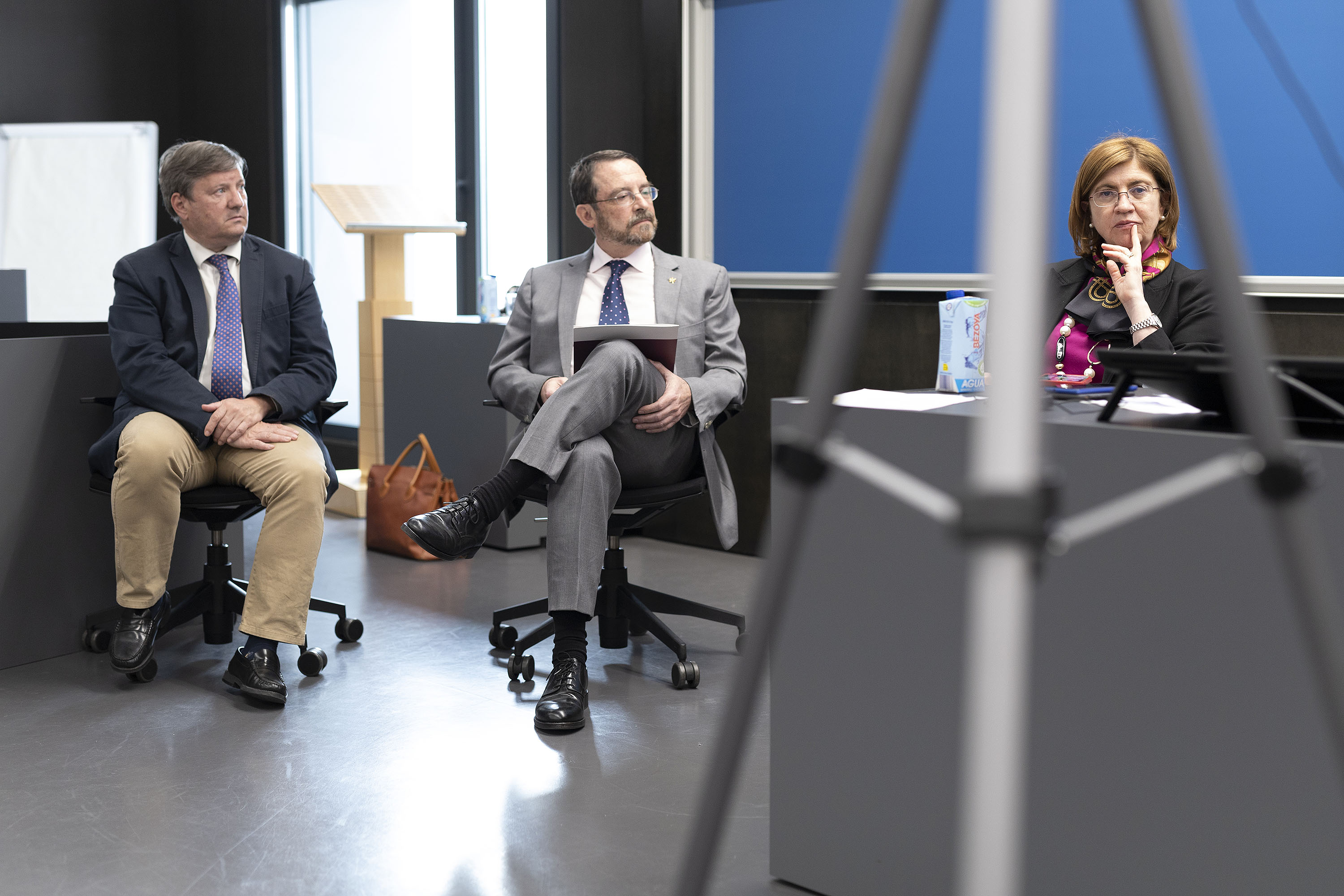NATO calls for increased defence expenseand strengthened deterrence policy to meet challenges to international order
At a session at the University of Navarra, the Alliance's Deputy Assistant Secretary General for Public Diplomacy, Carmen Romero, outlined some of the key aspects of NATO's new geostrategic framework, which will be defined at the next summit in Madrid.

PhotoJoseJuan Rico/From left to right, Rafael Moreno Izquierdo, Alfredo Sanz y Calabria and Carmen Romero, during the session that took place at campus of the University in Madrid.
21 | 04 | 2022
At a session held at campus of the University of Navarre in Madrid, NATO's Deputy Assistant Secretary General for Public Diplomacy, Carmen Romero, outlined some of the keys that will mark the new geostrategic concept of the Atlantic Alliance and that will be defined at the upcoming summit on 29 and 30 June in Madrid. According to Romero, the summit will be marked by the current conflict between Russia and Ukraine, the most serious military confrontation on European territory since World War II, and which will create a totally different scenario from the one that resulted from the last geostrategic framework, Cin 2010.
Carmen Romero spoke alongside Alejandro Alvargonzález, former University Secretaryattachment for NATO Public and Security Affairs and current ambassador to Peru; Alfredo Sanz y Calabria, Major General and former director of NATO's Supreme Headquarters (Shape) and Rafael Moreno Izquierdo, professor at the Complutense University of Madrid and security expert, in a roundtablewhich concluded the importance of increasing the expensein defence to guarantee the security of member states, as the only guarantor of preserving our current way of life; and the need for unity and associationamong the different states to face the challenges of those powers that do not recognise the rules of the international order, such as Russia and China.
Romero also said that the Alliance's main objective for the coming years is to preserve the security of allied countries and further strengthen the policy of deterrence, purpose. "We are thinking of a permanent presence, on a rotating basis, in the East of the Alliance and reinforcing our policy of partnerships with countries that are in a very delicate position vis-à-vis Russia, such as Georgia, Moldova and Bosnia," he said.
The meetingwas organised by the Global Affairs Center of the University of Navarra at partnershipwith Infodefensa.
For Carmen Romero, Russia's invasion of Ukraine is a violation of international law that breaks the European security architecture we had built with Russia since World War II. "Putin did not expect three things in this conflict: such strong Ukrainian resistance. The blitzkrieg has not been possible; an unprecedented display of unity by the West; and the strong response of NATO, the EU and countries such as Australia, Japan, New Zealand and South Korea, which have joined forces to isolate Russia in international organisations," he explained. Romero went on to detail some of the pillars of NATO's action in the conflict between Russia and Ukraine, which include preventing the war from spreading to Alliance countries, supporting Ukraine in exercising its right to self-defence and continuing the campaign of international pressure on Russia.
"The enemy must know that you are ready to respond".
"Russia will continue to be a problem for European security as long as it does not solve its internal imbalances," analysed Alejandro Alvargonzález, who affirmed that "the crux of the matter" is that the interests of the Russian people and the Kremlin are divergent. "It is false that Putin topicfears the military threat from Ukraine and NATO, what he really fears is that the countries are free and prosperous. We are attacked because of who we are and what we stand for".
Like Romero, Alvargonzález cited the policy of deterrence, coupled with defence and dialogue, as key to avoiding war: "The enemy must know that you are determined to respond," he added. He spoke of the need for NATO to operate in the spirit of being an alliance rather than an international organisation, where member states are willing to sacrifice national interest for the greater good.
Professor Rafael Moreno Izquierdo wanted to approach discussionfrom a Spanish perspective and, while acknowledging that the priority is in the East, added that NATO and its strategy for the coming years should represent for many Spaniards "an umbrella of security towards the South".
Major General Alfredo Sanz y Calabria focused his speech on the questioning of the current international order and how the countries of the Atlantic Alliance should deal with it. "What are the ends, the ways and the means that we are going to use to defend the values on which the Alliance is based? The problem is not just Ukraine-Russia, it is the general questioning of the international order as we have understood it," he said. Sanz y Calabria sketched a 360-degree NATO strategicframework Degrees, given that threats can materialise in any dimension, and put on the table the need to revise the 1949 Washington Treaty, which gave birth to the Atlantic Alliance to deal with the growing influence of the then-Soviet Union.
